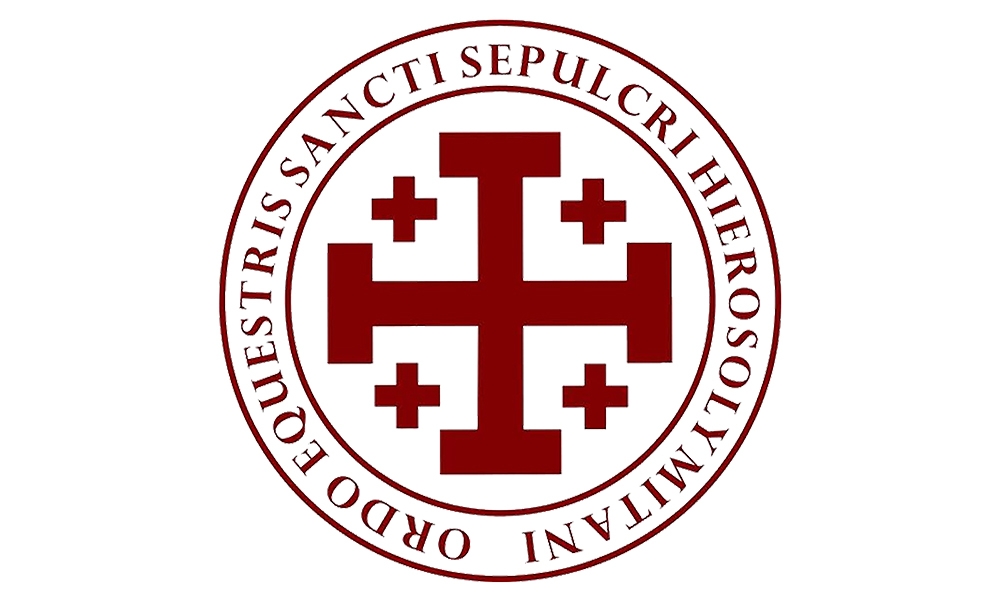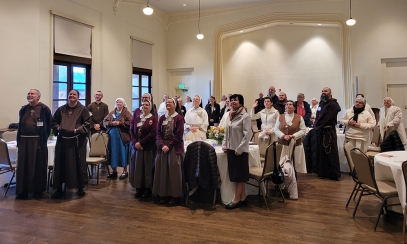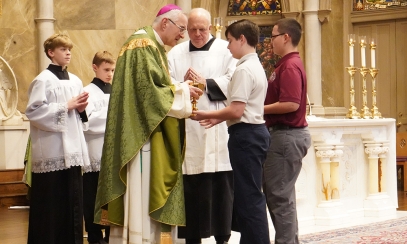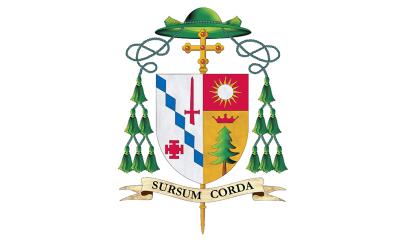
‘Weaving threads of justice where threads of division fray’
Bishop celebrates patronal feast of the Equestrian Order of the Holy Sepulchre
Bishop celebrates patronal feast of the Equestrian Order of the Holy Sepulchre
On Oct. 26, Bishop Raica celebrated Mass for the Equestrian Order of the Holy Sepulchre to honor the feast of Our Lady, Queen of Palestine, the patron of the order. The complete text of the bishop’s homily follows herein.
On Oct. 26, Bishop Raica celebrated Mass for the Equestrian Order of the Holy Sepulchre to honor the feast of Our Lady, Queen of Palestine, the patron of the order. The complete text of the bishop’s homily follows herein.
My dear brothers and sisters in Christ, knights and dames of the Equestrian Order, distinguished guests, and all who gather here under the mantle of the Blessed Virgin Mary, Queen of Palestine, grace and peace to you from our Lord Jesus Christ. Today, we assemble not merely as a community of faith, but as pilgrims of the heart, drawn to honor the Mother of God whose tender gaze has ever rested upon the sacred soil of the Holy Land. In this Mass, dedicated to her queenship over Palestine, we lift our eyes to Mary —that humble handmaid who became the vessel of divine mercy—and implore her intercession for all who dwell in the land of her Son's birth, life, death, and resurrection. As we reflect on the abiding concern of the Church for the preservation of these holy places—the cradle of our salvation—we are reminded that this land is not a distant memory; rather, it is a living witness to God's abiding love, demanding our care, our prayer, and our courageous action.
Our readings today invite us into the quiet strength of communal prayer and the triumphant song of God's justice. In the Acts of the Apostles, we behold the nascent Church in the upper room: "Then they returned to Jerusalem from the mount called Olivet, which is near Jerusalem, a sabbath day’s journey away. When they had entered the city, they went to the upper room where they were staying, Peter, and John, and James, and Andrew, Philip and Thomas, Bartholomew and Matthew, James son of Alphaeus, and Simon the Zealot, and Judas son of James. All these were constantly devoting themselves to prayer, together with certain women, including Mary the mother of Jesus, as well as His brothers." (Acts 1:12-14) Here, in the shadow of the Ascension, the Apostles do not scatter in despair. No, they gather—with the women, with Mary, with one another—in unceasing prayer. This is the Church's first posture: not conquest, but contemplation; not division, but unity under the watchful eye of the Queen of Heaven. Mary, present in that upper room, embodies the perseverance that sustains the Christian mission amid uncertainty. She teaches us that the Holy Land's preservation begins in prayer, in the fidelity of a community rooted in Christ, even as trials press upon the door.
And how does Mary pray? Not in silence alone, but in the exultant Magnificat, that revolutionary hymn of reversal and mercy: "Do not be afraid, Mary, for you have found favor with God. And now, you will conceive in your womb and bear a son, and you will name Him Jesus ... My soul magnifies the Lord, and my spirit rejoices in God my Savior, for He has looked with favor on the lowliness of His servant... His mercy is from age to age to those who fear Him. He has shown strength with His arm; He has scattered the proud in the thoughts of their hearts." (Luke 1:30-31, 46-48, 50-51) Mary's song is no mere lullaby; it is a blueprint for the Kingdom, proclaiming God's preferential option for the poor, the oppressed, and the forgotten. In the land of her fiat—the very hills of Nazareth, the valleys of Galilee—Mary sings of a God Who lifts up the lowly and fills the hungry with good things. As Queen of Palestine, she extends this mercy to every corner of her realm, calling us to echo her praise through deeds of justice and compassion.
This call resonates deeply in our time, my friends. The Holy Land, that thin space where Heaven touches earth, remains a beacon for all humanity—a place of pilgrimage, of encounter, and of profound spiritual significance. Yet, it is also a land wounded by conflict, where the echoes of ancient promises clash with the cries of today's suffering. Its preservation is not an abstract ideal; it is our sacred duty, for in safeguarding these stones and stories, we honor the living stones of God's people: the Christians who form the steadfast remnant there, numbering but a fraction of the population, yet bearing the full weight of our shared witness. As Cardinal Pierbattista Pizzaballa, the Latin Patriarch of Jerusalem, has poignantly observed, "Jerusalem is a land that is holy, but wounded because it is invaded by so much hatred and resentment." In this wound, we see the face of Christ crucified anew, and Mary's heart pierced alongside.
Our Holy Father Pope Francis echoes this maternal concern, urging us: "Let us stay close to them! Let us pray for them and for peace in the Holy Land and in the Middle East." Indeed, as Christians, "we must never tire of imploring peace from God." Yet prayer alone, vital as it is, must give way to the "clear and strong gestures" of which Patriarch Pizzaballa speaks—gestures of dialogue and action that build bridges across divides. For peace in the Holy Land is not a miracle to await passively, but a steady labor, requiring "great courage" to love amid enmity. The Church's mission there demands this: to proclaim a God Whose face is "above all, a face of peace," while respecting the inalienable dignity of every inhabitant—Jew, Muslim, Christian alike—as children of the one Father.
To you, knights and dames of the Equestrian Order of the Holy Sepulchre, this charge falls with particular grace and gravity. Your white mantle, adorned with the red cross, is no relic of chivalry past; it is a living vow to defend the tomb of Christ and the flock that tends it. In the spirit of the upper room, gather in prayer for the Holy Land's peace. In the echo of the Magnificat, rise to scatter pride with acts of mercy, supporting schools for the young, shelters for the displaced, and voices for the silenced. Let your concern be abiding, your care unflinching, as you honor the Queen who once fled to Egypt with her Child, knowing the fragility of refuge in a troubled land. As Patriarch Pizzaballa reminds the faithful in Gaza: "To remain steadfast in hope, we must be deeply rooted in Jesus. If we are connected to Him, we can look at one another with eyes of mercy." Rooted thus, you become instruments of Mary's queenship, weaving threads of justice where threads of division fray.
My dear friends, let us not cease "to dream of peace and to build relationships of peace!" In the coming days, commit to a daily Magnificat for the Holy Land—perhaps a decade of the Rosary or a gesture of solidarity through your order's works. For in Mary's care, we find our own: a concern that preserves not only stone and soil, but souls enkindled for the Gospel. May the Queen of Palestine, who pondered all these things in her heart, draw us closer to her Son, and may her intercession bring healing to the land she loves. May God bless you all!



